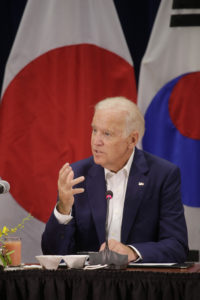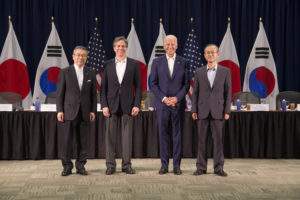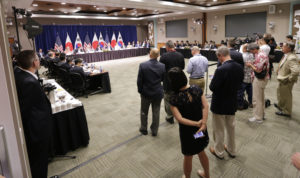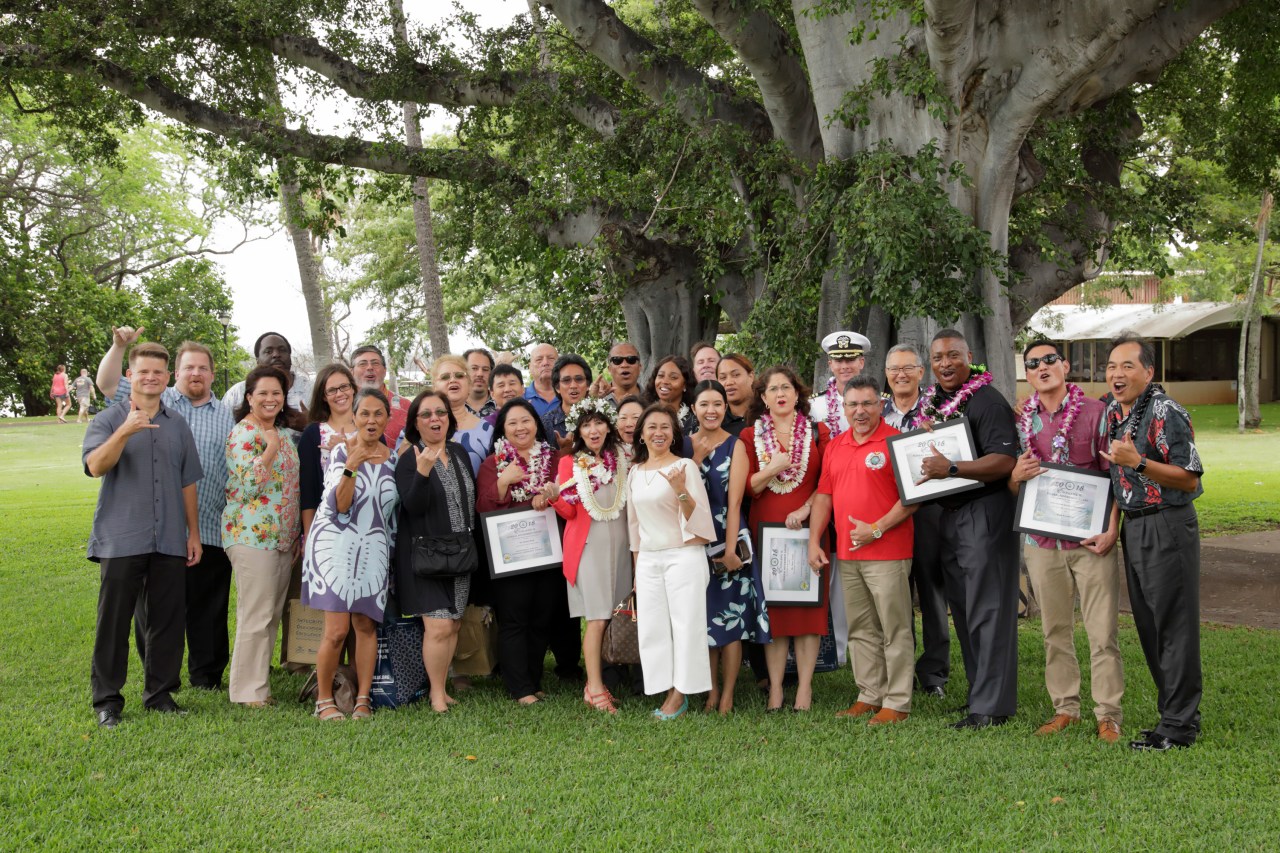
U.S. Vice President Joseph Biden discusses the importance of the
U.S.-Japan-Korea relationship during a high-level trilateral meeting July 14 At the Daniel K. Inouye Asia-Pacific Center for Security Studies. Participants
addressed key foreign policy and security challenges in the region to include North Korea, the South China Sea and terrorism.
Senior diplomatic officials from Japan, Republic of Korea and the United States met at the Daniel K. Inouye Asia-Pacific Center for Security Studies July 14 to address key political and security issues of mutual concern in the Asia-Pacific region. U.S. Vice President Joseph Biden opened the event with remarks on the vital relationship between the three nations.
“Over the past few years, we’ve made an unprecedented degree of progress in deepening and strengthening our relationship. It matters that we have the same strategic view and, tactically, are on the same page on the most important issues. Our presence in the region, our mutual cooperation, I think is vital to sustaining growth, stability and economic prosperity.”
The meeting was the fourth for the three nations conducted at the “deputy level.” Delegations were led by U.S. Deputy Secretary of State Tony Blinken, Japan Vice Foreign Minister Shinsuke Sugiyama and Korean Vice Foreign Minister Lim Sung-Nam.

U.S. Vice President Joseph Biden (second from right) is pictured here with leaders of the Japan, Korea and U.S. delegations taking part in the July 14 trilateral discussions at the Daniel K. Inouye Asia-Pacific Center for Security Studies. From left to right are Japan’s Vice Minister of Foreign Affairs Shinsuke Sugiyama, U.S. Deputy Secretary of State Tony Blinken, and Republic of Korea Vice Minister of Foreign Affairs Lim Sung-Nam.
At a post-event press conference, the three commented on principal concerns addressed in the roughly two-hour discussion. They stressed the need for continued resolve in countering North Korea’s military provocations, continued development of nuclear weapons capability and human rights abuses. Among other topics were maritime security, particularly in the context of events in the South China Sea, and terrorism.
Blinken said the meeting was highly productive and was illustrative of the U.S.’ increased focus on the region. The current U.S. administration, he explained, has “given real substance to the rebalance, deepening our strategic, economic and diplomatic ties with the region commensurate with its importance. The trilateral partnership among the United States, Korea and Japan is an indispensable and foundational pillar of our ‘rebalance.’”
Biden added, “When the three of us stand united to uphold the international order and speak with one voice for universal human rights and basic dignity, or address threats together, we amplify our impact. It shows the rest of the region they do not stand alone.”
Blinken thanked DKI APCSS for its help in hosting the event. “We had a terrific day yesterday…the hospitality could not have been better.” In addition to actual meeting space, the Center provided audiovisual and computing support, and administrative assistance.

Media representatives from Japan, Republic of Korea and the United States cover remarks by U.S. Vice President Joseph Biden July 14 as he opens the fourth trilateral meeting between the three nations held at the deputy foreign
minister/secretary of state level. The event took place at the Daniel K. Inouye Asia-Pacific Center for Security Studies.
“The DKI APCSS team is proud to have supported an important event that helped solidify present and future ties between the United States and two of its closest allies,” said retired Lt. Gen. Dan Leaf, Center director. “For the last 20 years, our Center has proven to be a premier location for leaders throughout the Asia-Pacific region to gather and chart paths toward greater cooperation and mutual understanding.”
Since 1985, more than 10,000 Fellows – to include defense, disaster response, and foreign affairs professionals – have taken part in the Center’s executive education program and regional outreach events. DKI APCSS offers six in-resident courses and a variety of workshops provide a common understanding of factors driving the region’s security environment. Equally important, the Center fosters close professional relationships among international Fellows and equips them with the leadership and problem-solving skills needed to affect positive change.
-END-








Leave A Comment